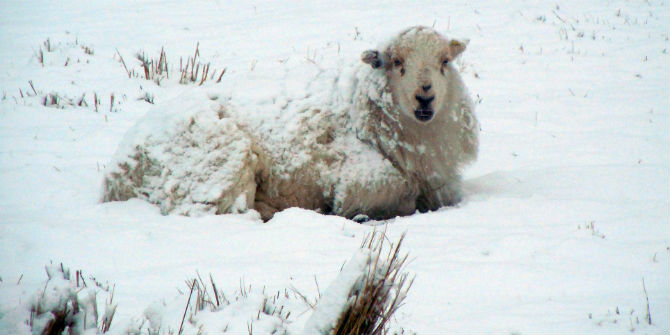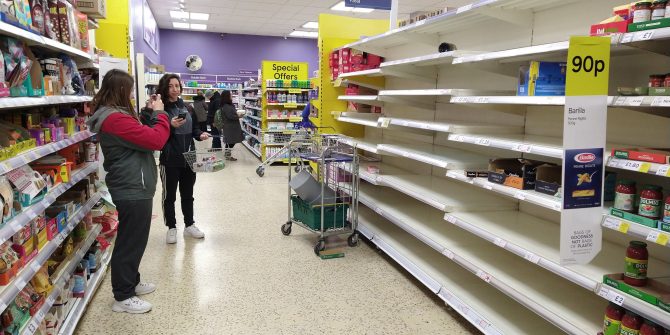The relationship between Michel Barnier and David Frost is growing terser than ever, write Ros Taylor and Roch Dunin-Wąsowicz (LSE). Meanwhile, with unemployment rising rapidly, Britons are being encouraged to pick fruit and veg in exchange for the minimum wage and schooling for their children.
How are the talks going? Badly. Briefly: no deal looks likelier than ever.

James Forsyth offers this insight:
The British government’s analysis is that the disruption caused by coronavirus means that the costs of leaving the EU single market without a trade deal are lower than they have ever been. This means the UK will take a tough line in these negotiations https://t.co/qYwfoptzD7
— James Forsyth (@JGForsyth) May 21, 2020
After Michel Barnier’s despairing announcement last Friday setting out how little progress had been made, both sides have dug in. Chief UK negotiator David Frost said the EU’s approach was ‘perplexing’ and wanted to know why it was “insisting on additional, unbalanced, and unprecedented provisions in a range of areas, as a precondition for agreement between us”. The documents setting out the UK’s aspirations reiterate that
Whatever happens, the Government will not negotiate any arrangement in which the UK does not have control of its own laws and political life. That means that we will not agree to any obligations for our laws to be aligned with the EU’s, or for the EU’s institutions, including the Court of Justice, to have any jurisdiction in the UK.
Barnier’s reply to Frost:
I share your commitment to helping the process move forward together. I do not think,
however, that an exchange of letters regarding the substance of the negotiations is
necessarily the best way to discuss on substantial points. It cannot be a substitute for
serious engagement and detailed negotiations and, in particular, I would not like the tone
that you have taken to impact the mutual trust and constructive attitude that is essential
between us.
‘The sense of urgency around these negotiations is increasing,’ says the BBC’s Chris Morris. However, Sam Lowe thought some progress had been made when the UK admitted that there would be new admin requirements for GB-NI trade. Meanwhile, the UK has launched its ‘Global Tariff‘ to replace the EU’s External Tariff, which scraps what it calls ‘nuisance tariffs’ of less than 2% and simplifies others. Tariffs on meat and cars remain, to protect British industry. Others, such as tampons, dishwashers, screwdrivers, dried thyme, mirrors and Christmas trees have been scrapped altogether.
The Bruges Group is pleased:
Many developing countries will be exempt from the new UK Global Tariff.
This means that they will be, effectively, granted preferential access to the UK Market.
This is fantastic. Aid through Trade in action.
— Bruges Group 🇬🇧 (@BrugesGroup) May 20, 2020
(Note that many developing countries are excluded from EU tariffs. See FullFact and BBC Reality Check.)
A leaked report by the C-19 Foresight group, a cross-government team which supports local resilience forums in England and Wales, warned a no-deal Brexit would overwhelm first responders already exhausted by the pandemic.
POLITICO profiles Liz Truss ahead of her trade negotiation mission in the US: “she will argue in government to push for the things she believes in” – is the verdict.
‘Come help pick for Britain to feed the nation!’ urges a new website designed to match unemployed Britons with farmers who need agricultural workers. The FAQs point out that anyone hired will be a designated keyworker and will therefore be entitled to schooling for their children. It features an appeal from the Prince of Wales.
Ahead of the upcoming bank holiday, The Atlantic notes that “there are few UK-wide nationalist moments.” Will Brexit become one, they ask?
On LSE Brexit
Britain has ruled out co-operation with the EU Parliament. This is a shortsighted mistake, argues Davor Jancic.
In the last of our in-depth series about the challenges facing the WTO, Ira Poensgren and Ceylan Inan explain why the question of what constitutes a ‘developing nation’ is such a vexed issue.
Tony Heron explores what impact, if any, the COVID-19 crisis will have on the political choices the government will be forced to confront in its trade negotiations with the EU and US about food.
Young Europeans in the UK feel uninformed about their rights post-Brexit, and unrepresented in UK politics, writes Alexandra Bulat.
Man I miss Brexit. Such a straightforward story
— James Rothwell (@JamesERothwell) May 18, 2020
This post represents the views of the authors and not those of the Brexit blog, nor LSE. If you’d like to receive the weekly roundup by email each Friday, subscribe here.






I trust Mr Frost takes a hard line in the run up to the final talks before telling the EU we have passed the date to extend the transition period.
I am sure most brexiteers are sick to death of the whole EU attitude to Brexit, they seem hell bent on the “punishment” idea that has now long passed with Boris’s majority.
Give them one last chance to give a fair deal, If they won’t cheerio!
Barnier was used to dealing with Olly Robbins and our ReMayner PM, who each did exactly as he wished despite her firm words at Chatham House.
It’s clear that Boris’s team since July has stood up to the EU bullies, firstly by getting the ‘unchangeable’ WA changed, and now demanding that the UK be treated as a sovereign nation during the trade talks. Boris deliberately shortened the length of the transition period in order to concentrate minds across the Channel.
The UK government has made its position crystal clear to Barnier, and it is not negotiable. A WTO trade arrangement is staring both sides in the face, and it is EU-based exporters who will have the harder time should that come to pass.
As Liam Fox famously alluded, the new trade deal should be the easiest in history to complete, because it already exists and is in daily use.
All that is needed is for the EU to acknowledge UK sovereignty and transfer the current arrangements over.